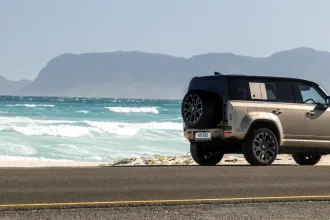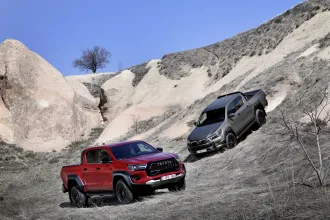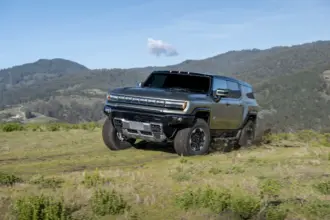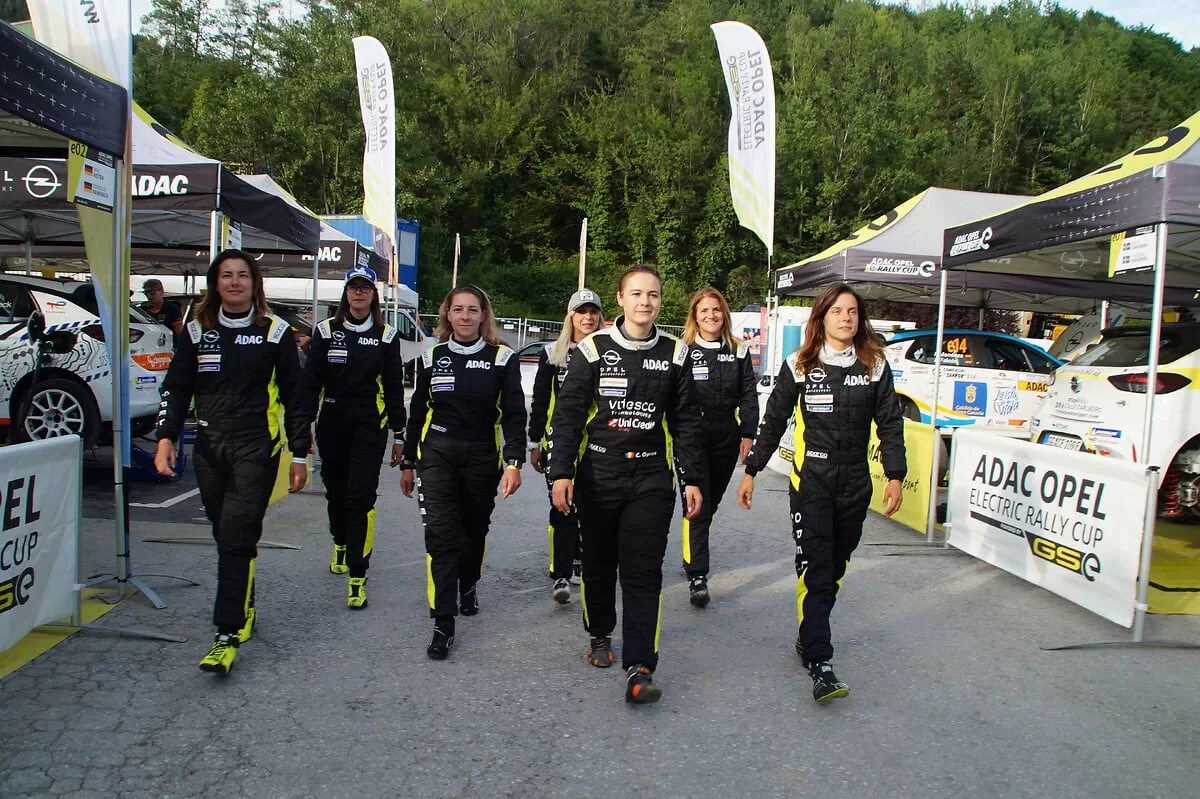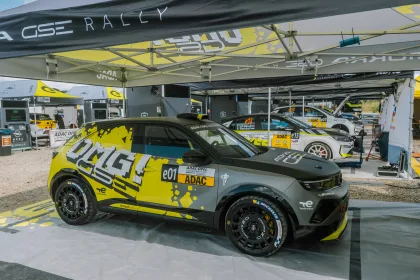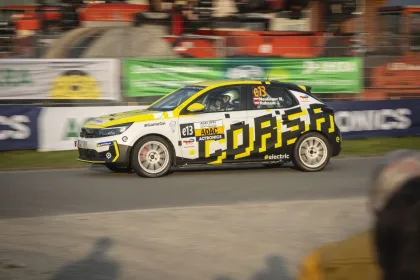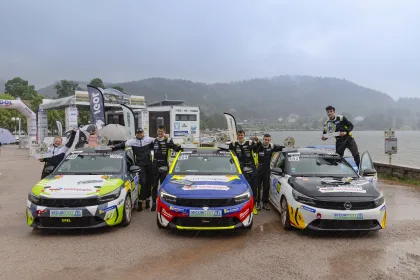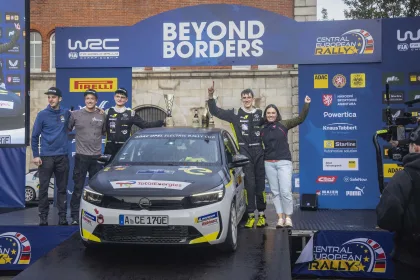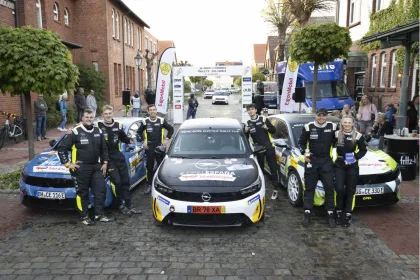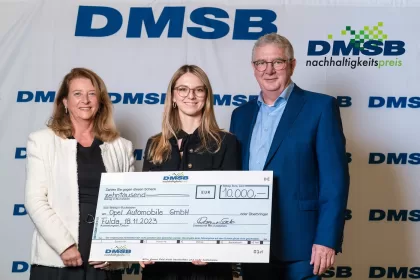- The pioneering rally project also impresses with gender diversity
- Three female drivers competing in the all-electric rally series
- Female co-pilots sought after in rallying
In the past, motorsport was often seen as a male dominated domain where women were seen as decorative accessories next to, but not in, the racing car. Luckily, such archaic clichés are a relic of a bygone era, and this is particularly true of the ADAC Opel Electric Rally Cup “powered by GSe”. In the third season of the world’s first electric one-make rally cup, female participants are now the norm. Including guest driver Cyndie Allemann, no fewer than nine female drivers or co-pilots took their seats in the 100 kW / 136 hp battery-electric Opel Corsa Rally Electric at the Rallye du Chablais in Switzerland.
And the competition quickly learned that the women mean business when Sarah Rumeau impressively said “bonjour” by setting the best time in the first special stage in the opening round or the 2023 season, the ADAC Rallye Sulingen. The 28-year-old from Brouzet-lès-Alès not far from Avignon can rightly be described as a natural talent. Only four years ago – on the advice of her mother – she got into a rally car for the first time as part of a preliminary round of the “Rallye Jeunes” support programne of the French motorsport association FFSA, won the intermediate round in the French overseas department of La Réunion and reached the semi-final in Nimes.
She has been rallying ever since with Julie Amblard, winner of the 2018 Rally Jeunes co-driver competition, at her side. Together, Rumeau/Amblard celebrated two titles in the women’s classification of the French Rally Championship. They are currently fourth in the ADAC Opel Electric Rally Cup and have their sights firmly set on their first podium finish.
And the 28-year-old is very clear about her ambitions. “I pursue my goals and try to assert myself against the competition – regardless of gender. That’s exactly why I find the ADAC Opel Electric Rally Cup so interesting. All teams have the same equipment –the crew in the cockpit makes the difference. And the mood in the cup is great, everyone is very friendly, even though the competition is tough,” said Rumeau.
Elsewhere, her FFSA Academy teammate, Cindy Gudet, took a different path. At the age of 14, the now 27-year-old, who comes from a small village near Lyon, sat in a kart for the first time. Later she continued with slaloms before she became the French “mountain queen”. She won the women’s classification of the French hill climb championship five times, last year she took fourth place overall in this strong championship.
Gudet sees the FFSA Academy’s programme in the ADAC Opel Electric Rally Cup, as “the perfect school for developing my driving skills. The step from mountain racing to rallying is huge. On the mountain, you are alone in the racing car, rallying is much more complex. You have a co-driver, drive according to the notes, the stages are much longer than in a hill climb. It’s not easy to get used to everything – but we are learning step by step. I have never cared who I am competing again. I’m a racer and just as motivated and determined as anyone else. The ADAC Opel Electric Rally Cup is great. The racing series enjoys a high profile, and the organisation is top-notch.”
While Gudet turned to rallying after establishing herself in other motorsport events, Cristiana Oprea has a completely different background. The 31-year-old from Bucharest only climbed into the cockpit of a rally car for the first time at the age of 21 – in her role as a public relations specialist. “I was hooked straight away, and I wanted to find out if I could do it too,” said the Romanian. By participating in the ADAC Opel Electric Rally Cup, Oprea sees herself as an ambassador for women in racing: “Motorsport is one of the few sports in which women and men have the same conditions. Gender is irrelevant during the competition, and I also feel privileged to represent and inspire women in motorsport.”
Oprea’s overall opinion on the ADAC Opel Electric Rally Cup speaks for itself. “It is a fantastic racing series! The men and women at the top are incredibly talented and really fast, which also helps me to keep improving. I love the rallies, the sporting spirit and the cooperative, friendly atmosphere in the cup,” she said.
The co-pilot: Organisational talent, psychologist and guide
While women are still underrepresented behind the wheel of a racing car compared to their male rivals, the balance is much more even among co-drivers. Rather, women are sometimes even very popular on the “hot seat”. “I think women don’t rush, they think more and try to analyse things calmly before they tackle them. Women tend to be calmer and more able to take stress off the driver. They are usually well organised and can focus on numerous things at the same time,” explained Julie Amblard. The 29-year-old from Dijon comes from a real “rallying family”: “My father was a rally driver, my mother a co-driver. They met at a rally and basically passed on my motorsport genes to me.”
The same applies to Cécile Marie (37), who is supporting Cindy Gudet in her debut rally season: “My father was a co-driver, my sisters are too. I think women are organised and careful. Many drivers also prefer a woman as a passenger because the clear voice in the intercom is easier to understand.”
Cornelia Nemenich, who recently celebrated her third win of the season in the ADAC Opel Electric Rally Cup alongside Max Reiter at the Weiz Rally, mentions another aspect: “A woman is usually smaller and lighter than a man, which is an important factor for many drivers. Psychology certainly plays a role too. A woman’s voice may have a calming effect on some drivers. Anything else I wouldn’t call gender specific.”
The 38-year-old German has already contested numerous rally seasons and can therefore voice a qualified opinion: “I feel very comfortable in the ADAC Opel Electric Rally Cup. The atmosphere among the teams is unique. At the end of the day, it doesn’t matter if your rally car is powered by an electric motor or a combustion engine. There are certainly differences in terms of driving – but for me the work in the cockpit is the same.”
Christina Ettel can only agree. The 36-year-old recently helped her driver Luca Pröglhöf to two podium finishes in a row. For the Austrian, psychology plays a decisive role both inside and outside of the rally car: “I believe that women are a little more sensitive when dealing with the driver. Because every driver is an individual. For example, when reading the notes, timing is an important issue and not every driver needs the same timing. This is where empathy is required. And multitasking is in our blood anyway.”
Ettel is a staunch advocate of the world’s first electric one-make rally cup: “I’m excited about the ADAC Opel Electric Rally Cup. This pioneering project is important because we all don’t know what the future will bring. Opel implements the cup extremely professionally. Despite all the competitive pressure, there is great cohesion among the teams. The battle is fought on the special stages, in between we have fun together. And the ADAC Opel Electric Rally Cup is the first one-make cup that I know for sure that everyone really has the same equipment. It makes cheating firstly pointless and secondly impossible!”


